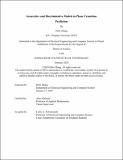Generative and Discriminative Models in Phase Transition Prediction
Author(s)
Zhang, Difei
DownloadThesis PDF (2.125Mb)
Advisor
Edelman, Alan
Terms of use
Metadata
Show full item recordAbstract
Accurate prediction of critical temperatures in phase transitions is crucial for understanding physical systems. Generative and discriminative models offer promising yet distinct approaches. Considering varying knowledge levels of the system, accessible data amounts, and computation resources of the experiments, these methods exhibit different accuracy and efficiency. This study aims to comprehensively compare six methods for predicting critical temperatures in the Ising lattice. Leveraging Julia’s capabilities will enable efficient parallel computation and benefit from its robust scientific machine learning ecosystem. The evaluation will focus on their performance concerning error rates, computation time, and required data. The goal is to guide researchers in selecting the optimal method within data and computational constraints for precise critical temperature estimation in complex physical systems.
Date issued
2024-02Department
Massachusetts Institute of Technology. Department of Electrical Engineering and Computer SciencePublisher
Massachusetts Institute of Technology